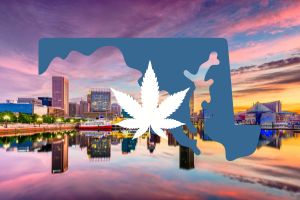Is Hemp Legal in Maryland?
Posted by Tweedle Farms on Sep 5th 2021

Navigating the Legal Landscape of Hemp in Maryland: Insights for Industry Stakeholders and Consumers
In the evolving panorama of cannabis legislation, Maryland presents a unique case study in the integration and regulation of hemp and the products made from hemp, including CBD flower, pre rolls, CBD gummies, and more. This comprehensive overview seeks to demystify the legal standing of hemp in Maryland, addressing pivotal concerns for both consumers and those in the industry.
The Legal Framework of Hemp in Maryland
The journey of hemp legalization in Maryland aligns with the federal Agricultural Improvement Act of 2018, commonly known as the 2018 Farm Bill. This landmark legislation distinguished hemp from marijuana based on its tetrahydrocannabinol (THC) content, legalizing hemp cultivation nationwide for plants containing less than 0.3% THC on a dry weight basis. Maryland, in response, updated its state laws to mirror this federal definition, effectively legalizing hemp and initiating a state-regulated program for its cultivation, processing, and sale.
Understanding Hemp, CBD Flower, CBG Flower, and THCA Flower
Before delving deeper into the legalities, it's crucial to differentiate between hemp flower, CBD flower, and THCA flower:
• Hemp Flower: Refers to the dried buds of the hemp plant, Cannabis sativa L., containing less than 0.3% THC. It's primarily used for extracting CBD, among other non-intoxicating cannabinoids.
• CBD Flower: Essentially the same thing as hemp flower. This term specifically denotes flower rich in cannabidiol (CBD) that is typically used for smoking.
• CBG Flower: Hemp flower that is high, or even dominant, in CBG.
• THCA Flower: A misnomer used to reclassify THC-rich cannabis as a hemp product.
Regulatory Oversight and Compliance
The Maryland Department of Agriculture (MDA) oversees the hemp program, mandating registration for growers and processors. Compliance with testing protocols is critical, ensuring THC levels do not exceed the legal threshold. This regulatory framework aims to safeguard consumer safety while fostering a legitimate market for hemp products.
The Industry Stakeholder Perspective
For cultivators and businesses within the hemp industry, Maryland's legal landscape offers both opportunities and challenges. The legalization of hemp has spurred agricultural innovation and economic growth. However, regulatory complexities require diligent navigation.
• Cultivation and Production: Adhering to state guidelines, including THC testing and crop reporting, is paramount. Stakeholders must stay informed about evolving regulations to ensure compliance and safeguard their operations.
• Market Development: The burgeoning market for CBD and hemp-derived products opens new avenues for economic development. Yet, the competitive landscape demands strategic marketing, product differentiation, and consumer education to thrive.
• Interstate Commerce: Federal legality facilitates interstate trade, yet state-specific regulations can complicate commerce. Maryland businesses must navigate these intricacies when engaging in national distribution.
Consumer Considerations
For consumers, the legal status of hemp in Maryland brings accessibility to a variety of hemp-derived products, including CBD and CBG offerings. However, informed decision-making is crucial:
• Product Safety and Quality: Consumers should seek products from reputable sources that provide transparent lab testing results, verifying THC content and purity.
• Legal Awareness: While hemp-derived products are legal, consumers must understand the nuances, such as the distinction between legal hemp CBD and regulated cannabis products containing higher THC levels.
• Therapeutic Potential: Many turn to hemp-derived products for their purported health benefits. While research is ongoing, consumers should approach these products with a balanced perspective, considering both potential benefits and limitations.
Challenges and Future Directions
Despite the strides made in legalizing and regulating hemp in Maryland, challenges persist. Ambiguities in federal versus state law, banking restrictions for cannabis-related businesses, and fluctuating market dynamics present ongoing hurdles. Furthermore, the need for continued research into hemp's agricultural best practices and therapeutic potential remains critical.
Looking ahead, Maryland's approach to hemp regulation may evolve in response to technological advancements, market trends, and societal attitudes towards cannabis. Stakeholder engagement, consumer education, and legislative adaptability will be key factors in shaping the sustainable growth of the hemp industry in the state.
Conclusion
The legal landscape of hemp in Maryland reflects a dynamic interplay between federal mandates, state regulations, and market forces. For industry stakeholders, navigating this terrain requires a keen understanding of legal obligations and market opportunities. Consumers, on the other hand, are tasked with making informed choices in a rapidly expanding marketplace. As Maryland continues to refine its hemp policies, the potential for innovation, economic growth, and consumer well-being stands at the forefront of this green frontier.



